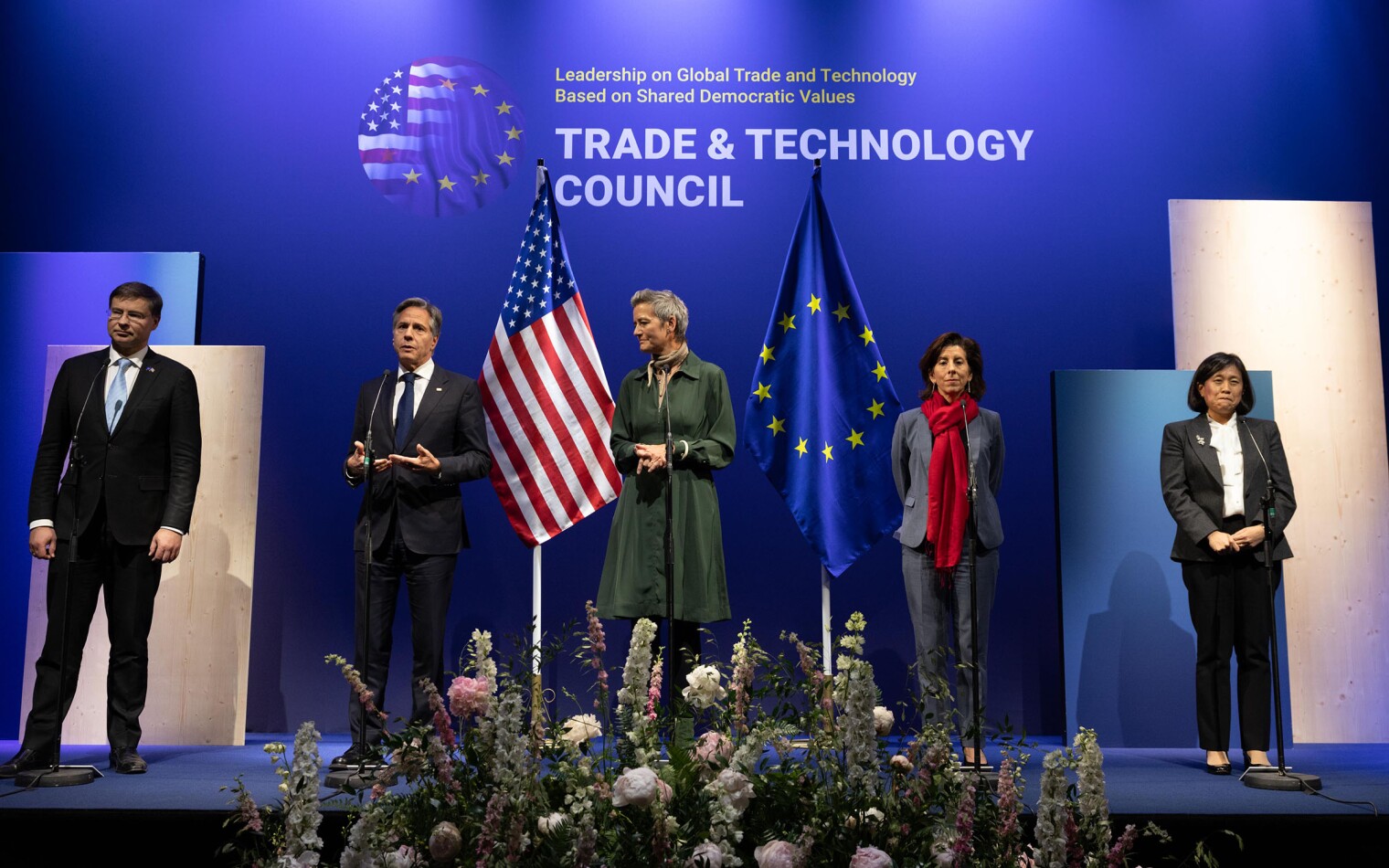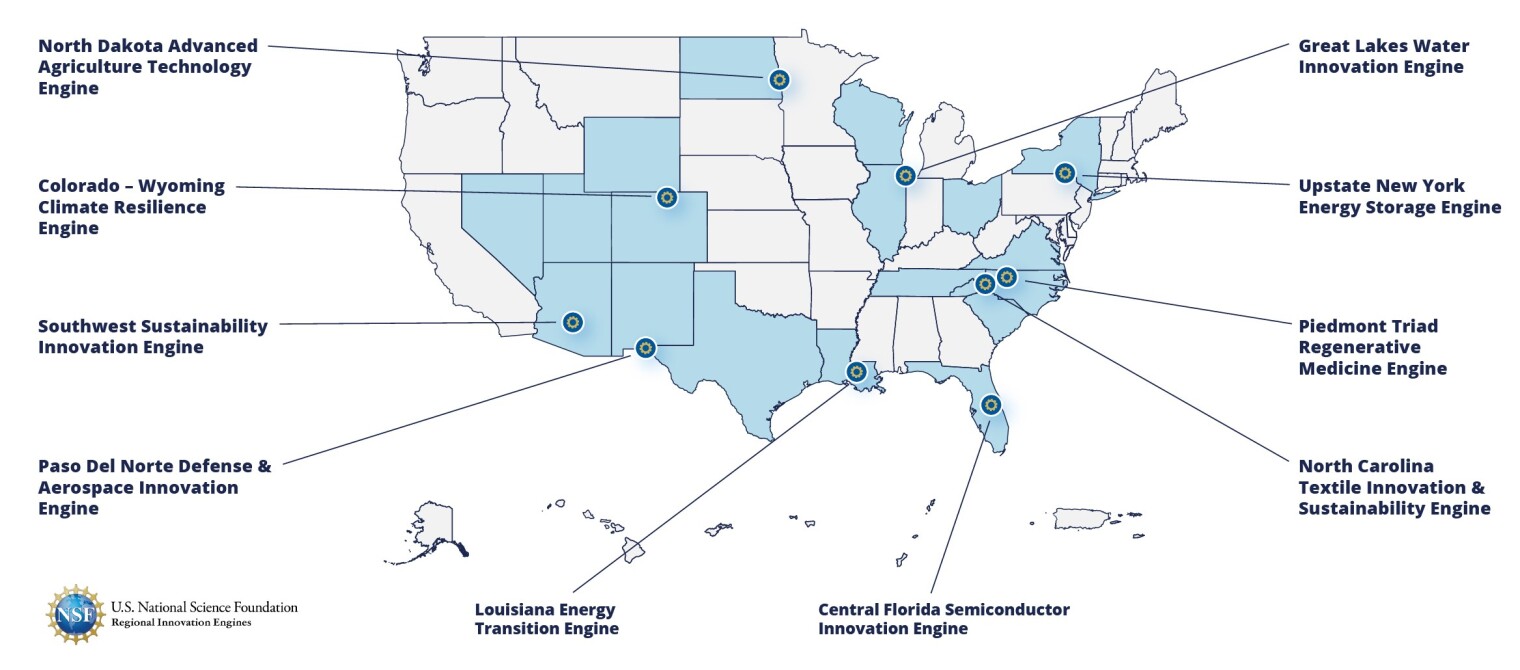| |
| FYI: Science Policy News from AIP |
| THIS WEEK |
|
|
|
|
|
|
| What’s Ahead |
 |
| A meeting of the U.S.-EU Trade and Technology Council in May 2023. This week, the council is meeting for the fifth time since its establishment in 2021. (Chuck Kennedy / State Department) |
EU Officials to Discuss Research Security Initiatives
The U.S.-EU Trade and Technology Council will convene on Tuesday in Washington, DC, a week after the European Union announced new economic security initiatives that focus on research security, export controls, and investment screening. Among the initiatives are research security recommendations that aim to increase the consistency with which EU member states handle tasks such as risk reviews of potential collaborators. The EU has also developed a proposal for regulating outbound investments in advanced technologies such as semiconductors and quantum computing, analogous to steps recently taken by the Biden administration to block U.S. persons from investing funds in certain Chinese companies. Council co-chair Margrethe Vestager will discuss the economic security initiatives on Tuesday at the Atlantic Council with Commerce Secretary Gina Raimondo and on Wednesday at the Center for Strategic and International Studies. Separately this week, the House Financial Services Committee will explore different approaches to regulating outbound investments at a hearing on Tuesday, and the U.S.-China Economic and National Security Commission will meet on Thursday to examine China’s research into military applications of AI and quantum information science, among other subjects. Notably, the commission has recently proposed that Congress expand inbound foreign investment reviews to include research contracts. (Correction: This item has been updated to correct the time of the Atlantic Council event. It is on Tuesday, not Wednesday as originally reported.)
Earthquake and Windstorm Mitigation Programs Slated for Refresh
The House Science Committee will meet Tuesday to discuss potential updates to the National Earthquake Hazards Reduction Program (NEHRP) and the National Windstorm Impact Reduction Program (NWIRP). Congress created NWIRP in 2004 to mitigate economic losses from severe windstorms and last updated it in 2015. Science Committee members introduced bipartisan legislation in 2022 to further update the program but it did not advance. Congress created NEHRP in 1977 to improve earthquake monitoring and resilience and last revised the program in 2018. Bipartisan legislation to update the program has already been introduced in the Senate. The witnesses for this week’s hearing are Jason Averill, deputy director of the engineering lab at NIST; Edward Laatsch, director of the safety, planning, and building science division at the Federal Emergency Management Agency; Gavin Hayes, earthquake hazards program coordinator at the U.S. Geological Survey; and Susan Margulies, head of the Engineering Directorate at the National Science Foundation. Each of these agencies participates in the programs, with NIST overseeing both. According to the hearing charter, the hearing will examine the programs’ strengths and weaknesses, how they have improved the understanding of windstorms and earthquakes, how interagency collaboration helps advance their goals, and what updates are needed to address emerging challenges.
NTIA to Host Symposium on National Spectrum Strategy
The National Telecommunications and Information Administration will host a symposium Thursday focused on the National Spectrum Strategy. The Biden administration released the strategy last November to improve management of the increasingly scarce radio spectrum, including through a “moonshot effort” in spectrum sharing R&D. The strategy requires NTIA to publish an implementation plan by early March, and dozens of companies and trade groups have submitted comments ahead of its release. Among the keynote speakers at the symposium is Arati Prabhakar, director of the White House Office of Science and Technology Policy, which the strategy tasks with developing the National Spectrum R&D Plan.
Nuclear Deterrence Summit Kicks off in DC
Numerous leaders from the National Nuclear Security Administration are in Washington, DC, this week for the 16th annual Nuclear Deterrence Summit. The directors of Lawrence Livermore, Los Alamos, and Sandia National Labs will discuss geopolitical challenges facing the nuclear security enterprise in a panel discussion on Wednesday. Top weapons R&D officials from each lab will also speak on Thursday about challenges facing warhead life extension programs, following a keynote address by NNSA Administrator Jill Hruby.
|
|
| In Case You Missed It |
 |
| A map of the National Science Foundation’s 10 inaugural Regional Innovation Engines. (NSF) |
NSF Announces First Winners of Major ‘Engine’ Awards
On Monday, the National Science Foundation announced the 10 inaugural Regional Innovation Engines, each of which will receive up to $160 million over a decade to catalyze regional ecosystems for R&D. Selected from among 16 finalists, the awardees are:
- The Central Florida Semiconductor Innovation Engine,
- The Colorado - Wyoming Climate Resilience Engine,
- The Great Lakes Water Innovation Engine,
- The Louisiana Energy Transition Engine,
- The North Carolina Textile Innovation and Sustainability Engine,
- The North Dakota Advanced Agriculture Technology Engine,
- The Paso del Norte Defense and Aerospace Innovation Engine,
- The Piedmont Triad Regenerative Medicine Engine,
- The Southwest Sustainability Innovation Engine, and
- The Upstate New York Energy Storage Engine.
The regenerative medicine and sustainable textiles Engines were announced separately last Friday at an event with First Lady Jill Biden. Among the finalists that did not make the cut is the only quantum-focused proposal: the University of Chicago’s “Quantum Crossroads.” In announcing the awards, NSF said that some of the remaining finalists and semifinalists will be invited to apply for Engines Development Awards, grants of up to $1 million that aim to help refine applications for future Engine awards. NSF has already provided 44 such grants. The White House also highlighted how other agencies will support Engine awardees in a press release.
NSF Launches AI Research Infrastructure Pilot
The National Science Foundation launched the pilot version of the National AI Research Resource (NAIRR) on Jan. 24 in response to a requirement from President Biden’s executive order on AI. A website set up to manage the NAIRR states the pilot “aims to connect U.S. researchers and educators to computational, data, and training resources needed to advance AI research and research that employs AI.” The pilot program has four focus areas:
- open AI research through NAIRR Open,
- secured, private research through NAIRR Secure,
- interoperability efforts through NAIRR Software, and
- educational efforts through NAIRR Classroom.
The computing resources currently on offer through the NAIRR include Summit at Oak Ridge National Laboratory, Delta GPU at the National Center for Supercomputing Applications, Lonestar6 and Frontera at the Texas Advanced Computing Center, the AI Testbed at Argonne National Lab, and Neocortex at the Pittsburgh Supercomputing Center. The pilot program is accepting usage requests through March 1.
STEM Visa Expansion Efforts Detailed by Biden Officials
The National Institute of Standards and Technology held a webinar on Jan. 23 to highlight recent U.S. policy initiatives that aim to attract international talent to the country by streamlining visa application and renewal processes. Among them, U.S. Citizenship and Immigration Services issued new guidance on national interest waivers for EB-2 immigrant visas, clarified eligibility for O-1A nonimmigrant extraordinary ability visas, and is running a pilot program allowing H-1B visa holders to renew their visas without leaving the country – a step that officials participating in the webinar said would reduce wait times and decrease uncertainty for applicants and employers. More details shared during the webinar can be found here.
Prospective US Ambassador to UNESCO Shares Goals for Rejoining Agency
The Senate Foreign Relations Committee held a hearing on Jan. 25 to consider the nomination of Courtney Diesel O’Donnell as U.S. ambassador to UNESCO, a United Nation agency that advances educational, scientific, and cultural initiatives. O’Donnell currently is a senior advisor to Vice President Kamala Harris and acting chief of staff for Second Gentleman Doug Emhoff. If confirmed, O’Donnell said her priorities would be to increase transparency at UNESCO, counter the influence of China, Russia, and other competitors within the agency, and fight anti-semitism and anti-Israel bias. The U.S. withdrew from the agency in 2017, accusing it of anti-Israel bias, but rejoined in 2023. In her opening statement during the nomination hearing, O’Donnell said she is “fully aware that institutions like UNESCO are far from perfect, but issues critical to our national security are being addressed there every day” and the U.S. should be at the table. While UNESCO is best known for its work on World Heritage sites and preserving cultural treasures, O’Donnell emphasized to senators that the agency is also involved in developing norms and standards for emerging technologies such as AI and neurotechnology, leading scientific collaborations across nations, and expanding STEM education opportunities for women and girls.
NASA Retires Overachieving Mars Ingenuity Helicopter
 |
| NASA’s Ingenuity helicopter photographed in flight by the Perseverance Mars Rover. (NASA / JPL-Caltech / ASU / MSSS) |
On Jan. 25, NASA ended the mission of its Ingenuity helicopter, which has been operating on Mars since it arrived there nearly three years ago. Ingenuity cost $80 million to build and accompanied the Perseverance rover as a technology demonstration, with the goal of undertaking five flights over 30 days to test the feasibility of flying in the planet’s extremely thin atmosphere. After Ingenuity surpassed expectations, NASA extended its mission and incorporated it into Perseverance’s science operations. Surveying the terrain around the rover’s path, Ingenuity ultimately performed 72 flights, flying for a total of more than two hours, before it damaged one of its rotors during its last landing. The helicopter’s astonishing success has led NASA to integrate similar vehicles into its design for its Mars Sample Return mission. Ingenuity’s operators at the Jet Propulsion Lab are now performing final tests on its systems and downloading imagery and data from onboard memory before powering it down.
|
|
| Upcoming Events |
All events are Eastern Time, unless otherwise noted. Listings do not imply endorsement. Events beyond this week are listed on our website.
Monday, January 29
Tuesday, January 30
Wednesday, January 31
Thursday, February 1
Friday, February 2
Monday, February 5
Know of an upcoming science policy event either inside or outside the Beltway? Email us at fyi@aip.org.
|
|
| Opportunities |
|
Deadlines indicated in parentheses.
Job Openings
Solicitations
Know of an opportunity for scientists to engage in science policy? Email us at fyi@aip.org.
|
|
| Around the Web |
|
News and views currently in circulation. Links do not imply endorsement.
White House
Congress
Science, Society, and the Economy
Education and Workforce
Research Management
Labs and Facilities
Computing and Communications
Space
Weather, Climate, and Environment
Energy
Defense
Biomedical
International Affairs
|
|
|
| |
| This message is sent to you because you signed up for one of our newsletters. To manage your AIP email preferences and newsletter subscriptions ( add or remove ), please click here. Or to automatically unsubscribe from all AIP emails, click here. As a 501(c)(3) non-profit, AIP is a federation that advances the success of our Member Societies and an institute that engages in research and analysis to empower positive change in the physical sciences. The mission of AIP (American Institute of Physics) is to advance, promote, and serve the physical sciences for the benefit of humanity. |
|
| © 2025 American Institute of Physics. |
AIP, 1 Physics Ellipse, College Park MD 20740-3841
301.209.3100 - newsletters@aipcomm.org |
|
|